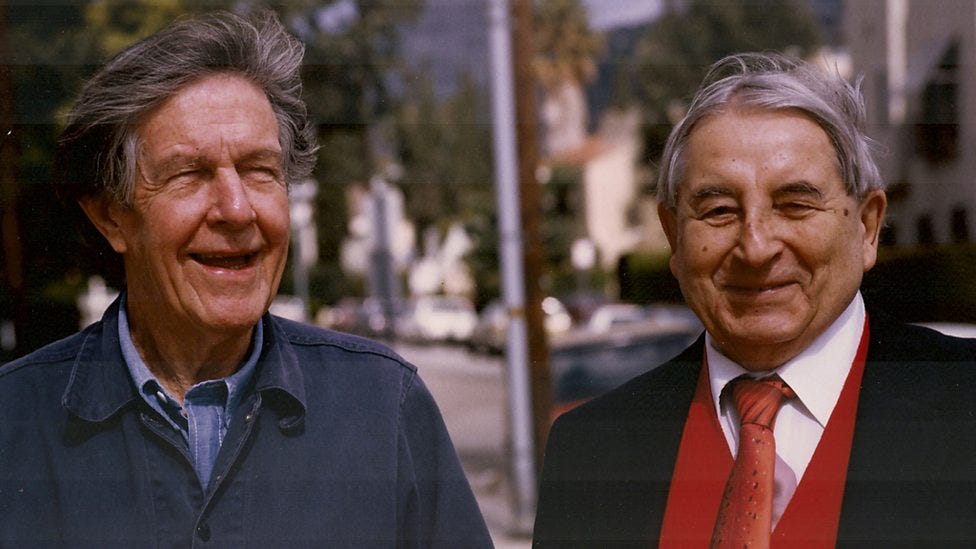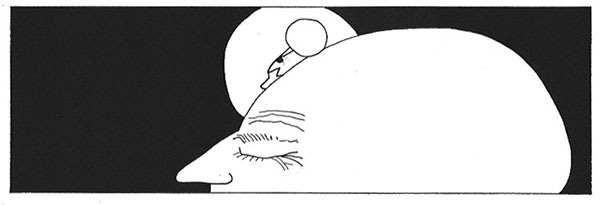April 27, 2023 : Issue #41
WONDERCABINET : Lawrence Weschler’s Fortnightly Compendium of the Miscellaneous Diverse
WELCOME
This time out a special issue in which my own family, across various instantiations and to varying degrees, confronts and colludes in the relentless onslaught of the technological.
* * *
The Main Event
My brother Ray challenges ChatGPT to a round of softball-scribing, with dubious results
Some of the old-timers among you may remember the wildly heterodox softball game my brother Ray has been curating in Berkeley every Sunday for well over twenty-five-years now (“The Finest Unaffiliated Email-organized Softball League West of the Sacramento River,” as he characterizes it, with typical bravado, or “Rayball,” as the rest of his community denominate the thing, for short). For more on which see the middle of our Issue #20.

And you may in turn remember how key to the whole endeavor have been the Tuesday midnight emails he regularly sends out, summarizing the previous Sunday’s encounter (in terms so reliably mock-bleak and self-laceratingly funny that the letter gets subscribed to by fans literally all around the world, including in North Korea!), all as prologue to a concluding round of groveling in which he begs participants to sign up for the coming Sunday’s Sisyphean exertions.
Well, apparently a few Tuesdays back, for the first time in over twenty-five years, he just couldn’t bring himself to muster the energy necessary for producing his weekly missive (I can sympathize, believe me) and instead…well, I’ll let him take things from there:
Dear People,
I was feeling a bit lazy these last couple days, and so if you’d be so kind as to indulge my torpor, I asked the great ChatGPT to write up this week’s analysis:
*
Unfortunately, it appears that I do not have access to Ray Weschler's writing style, as he is not a well-known figure in literature or journalism. However, I can provide a simple summary of the softball game you mentioned:
On Easter Day, your team played against Chris Fure's team in a softball game, but unfortunately, your team lost with a score of 14-11. While this may have been a disappointing outcome, it is important to remember that losses are a natural part of any competitive activity and can provide opportunities for learning and growth.
*
Well, and with all due respect, my guess is that some reasonably educated white-eared titi monkeys could’ve produced a more inspiring review without the cringe-inducing piffle, but of course they aren’t considered artificial or intelligent, and so they’re stuck in the Oakland Zoo running around like the vine-swinging nutjobs that they are. Honestly, between our stupid simian cousins and the dumbass AI that is apparently determined to replace us as a species, I think we humans have comparatively little to be ashamed of. And therefore there will be a game at Codornices this Sunday at 11, IF I get enough commits by this Friday morning . . . Raymond
Luckily, Ray seemed to recover from his rhetorical torpor the following week, producing a fresh missive replete with all manner of Rayified feints and insights, including a fresh litany of things to fret over, to wit:
The point is that you may be feeling overwhelmed by inflation and global warming and nutso wokesters and doubly illiberal nutso anti-wokesters and the perils of AI and the ludicrous existence of the debt ceiling and our general indifference to the actual national debt and the risks of war over Taiwan and the situation in Ukraine and the poison of busy-body NIMBYism and the contemptible Hayward Fault and the ubiquity of intrinsically worthless crypto-crap and the rise in unprosecuted street crime and the ceaseless mass shooting, mental health and housing crises and the totally unacceptable aging process and the cynical exploitation of the half dozen self-perpetuating anti-majoritarian structural flaws in American Democracy and the dysfunctional paralysis of our regulatory governance and the pathetic state of political discourse and the anti-vaxxers and the conspiracy loons and all the authoritarian slimeballs everywhere and the dumbAssification of the entire human species via social media and the utterly insoluble nature of ultimate ontological origins and the ceaselessly insane things that your friends and family never stop saying (to name just a few random things).
Yet at the end of the day…
And so forth. For the full blast, see here. But anyway, thank god, all is nonetheless right with this one little aspect of the world: Ray has roused himself from his momentary torpor and is back in the scribbler’s seat, once again succoring and regaling us through our own respective dark midnights of the soul.
But that whole ChatGPT incident got me to thinking yet more about the ongoing, oncoming onslaught of the digital. Of course, we’ve glanced upon this terrain before here in the Cabinet, notably by way of our various dalliances with Google’s Blaise Agüera y Arcas (the three-part print interview spread over issues 17, 18 and 19, supplemented by the videotaped conversation I had with him at the Hammer in LA last January). And there have been all manner of useful commentaries elsewhere as well in recent weeks. In particular I commend to you a particularly trenchant piece by Noam Chomsky in the NY Times in which the eminent linguist and leftist critic notes how while such programs may at times (not always) prove adept at synthesizing correct descriptions of the workings of the world, they will never be able to understand them, there being a profound difference between the two, and that that failure in turn will always prevent the programs in question from being able to achieve any true ethically grounded position. Thus, after quoting in detail from a colleague’s exasperating conversation with ChatGPT over the advisability of terraforming Mars, Chomsky concludes,
Note, for all the seemingly sophisticated thought and language, the moral indifference born of unintelligence. Here, ChatGPT exhibits something like the banality of evil: plagiarism and apathy and obviation. It summarizes the standard arguments in the literature by a kind of super-autocomplete, refuses to take a stand on anything, pleads not merely ignorance but lack of intelligence and ultimately offers a “just following orders” defense, shifting responsibility to its creators.
Meanwhile, over on his own always fascinating (nay, essential!) Hinternet substack, philosopher and all-around intellectual boulevardier Justin E. H. Smith recently engaged in a marvelously droll and tumbling series of “Dinners with GPT-4,” from which he emerged with the conviction that “The real danger of ‘AI’ {is} not that it will ever ‘think better’ than we do —it’s dumb as a box of rocks!— but that it will continue to curtail and suppress what we human beings are able to say, and that it will do so without thinking at all.”
My own additional contribution to the discourse, based on brother Ray’s recent experience, is that such bot programs currently and probably will necessarily always lack a sense of humor, or more to the point THE SENSE of humor. They may be able to broadly pastiche and approximate the humor-styles of individuals to whose corpus of work they have been exposed; they may even be able to “explain” what is “funny” in any given joke they are asked to comment upon (indeed, there is already considerable evidence as to their being able to do so). But they will never be able to generate novel, circumstance-grounded (occasion-responsive) humor of their own, the sort of thing Ray seems to be able to do all the time, precisely because such humor grows out of the specifically-rooted, deliciously-individuated, and utterly contingent character and history and temperament of the person in question, their feel for the essential absurdity of embodied existence (there can be no belly laughs where there are no bellies)—for more on which see David Gelernter’s recent Washington Post piece in which the celebrated Yale professor of computer science argues that bots and programs, not being embodied, can’t feel anything by definition, whereas our very humanity—the actual way we think and make our way through the world—is as much if not more rooted in sense and sensation as it is in calculation and approximation.
With which I myself agree completely, or at least divinely hope.
* * *
Meanwhile, my daughter Sara’s “Find and Replace” function inadvertently generates a poem of its own
Which is not to say that these programs are entirely without their creative uses. Recently, someone in our family WhatsApp thread made a joke about how often various Weschlers use em dashes in their writing. On a whim, my daughter Sara decided to check how frequently the punctuation figured in a note she was writing to her PhD advisor at that very moment — and so she engaged the “find and replace” function in her email program to do just that. The program opened up a sidebar showing every instance of an em dash in her text. The resulting list of phrases took the form of a sequence of couplets, which in turn, Sara felt (and I concur) came off reading as a strangely uncanny, madcap Dadaesque, Cage-Oulipian poem in its own right. Enjoy!
out ideas, and try to fit together
all the — occasionally contradictory
together all the — occasionally
contradictory — material I have).
I feel I have to somehow fit into
the article — and then each of
hit by the sleeping sickness
epidemic — and yet, if you
overshadowed, and/or displaced
by other factors — all of which
if the Acholi are the victims of history
(as a Pole — and a Jew, for that
history (as a Pole — and a Jew, for
that matter — I’ve been force-fed
1913 (i.e. the displacements
themselves) — District
an effective means of sleeping
sickness control — and whether
population resettlement in the Nile
Province — due precisely to the
, in one case I have the actual
report — in another, I only have
Paula Hirsch Foster’s notes on the
report to go off of … not sure how
Paula Hirsch Foster’s notes on the
report to go off of … not sure how
the schedule for planting millet,
etc. etc.) — i.e. the factors that
Game culling — This is a really
interesting one but applies more
. The idea was debated in the
early 1910’s — a moment when the
settler colony. In 1915, the debate
was shelved — with a stipulation
have gone quite differently in the
Protectorate — with game culling
Reclamation — another really
interesting topic, with more direct
(n.b. even without reclamation, by
1936 one clan — Alokolum — would
reclamation, by 1936 one clan —
Alokolum — would actually
a memo from our old friend J.R.P.
Postlethwaite — long since
is where I think notions of land
tenure come in — at least in some
I’m sorry this is taking me longer
than expected — but I hope
As do we, Sara, as do we.
* * *
For that matter, our mutual progenitor, my grandfather the modernist composer Ernst Toch, was himself monkeying around at the technological frontier over a century ago

Every once in a while, when I happen to meet a professional DJ of one sort or another in the course of my daily rounds, I am likely to point out that my grandfather actually invented “rap music” almost a century ago. At this point the DJ in question is likely to swell up in indignation and glare down on me with a “What the hell do you think you are talking about, small pointless Semite person?” sort of expression. At which point I hasten to add that this is not just my opinion, the great avant garde conductor and musicological lexicographer Nicolas Slonimsky often maintained as much.
I then go on to relate how in the late 1920s in Berlin, my Weimar modernist composer grandfather Ernst Toch (whose full life tale I’ve previously related in the Cabinet here, as I have also occasionally related Slonimsky’s doings as well, as, for example, here)—anyway Toch was into experimental projects of all sorts, and at one point he invented a form of Spoken Chorus, which is to say a series of extended standard four-part (soprano / alto /tenor / bass) scores for monotone speakers (as opposed to melodically pitched singers). The full suite in question consisted of three parts, which were recently included in a marvelous new CD compendium from The Astra Choir (John McCaughey, director) by way of New World Records, Unsettled Choruses: A Terrain of Humming and Phonetics 1930-1974), from which I will be drawing in the notes that follow.
The first (“O-a”) featured simple vowel sounds in an intricate contrapuntal array, and can be heard here:
“O-a”
The second (“Ta-tam”) introduced more percussive consonant-based syllabic expostulations:
“Ta-tam”
And the third, the most famous (and indeed perhaps Toch’s single most famous piece of all, just Google it to sample the dozens of videos of inspired amateur and not-so-amateur performances) was the Fuge aus der Geographie, the Geographical Fugue:
“Geographical Fugue”
(For the more detailed and musicologically nuanced liner notes to the New World recording, see here.)
Several years later, in 1935, once the Tochs, in flight from Hitler, had settled in Pacific Palisades, there came a knock at the door and a young gentleman inquired whether the man opening it was indeed Professor Toch—yes…?—the author of the Geographical Fugue?—yes, but really that was only a divertissement—No, no, it was very important! This was John Cage (late of LA High School, where he had been the Valedictorian)
coming to inquire whether the good professor would accede to his and his friend Henry Cowell’s wish to publish a translation of the piece in their incipient journal New Music. And Toch indeed acceded. (A translation, incidentally, because the German original had begun with a rolling “Ratibor” which allowed the thundering Rrrrrrrratibor at the very end, which would not have worked in English, so that Cage and Cowell replaced it with “Trrrrinidad!”)
Anyway, so I would tell the looming DJs all of that, and their countenances would begin to soften, but then the clincher came when I told them that the real reason Toch had contrived the pieces in the first place is that he was busy experimenting with then-new-fangled wax cylinder recording devices and what he really wanted to see is what the pieces would sound like sped up to the equivalent of 78 rpms—and that really caught the attention of the DJs (for now this was truly some kind of forebear, Semite or no!). In the past, I wasn’t able to refer them to actual sped-up versions, but the good folk at New World Records included precisely suchlike on their CD, as follows, and now you too can see how Toch not only anticipated rap music but Alvin and the Chipmunks as well!
Here are the same three pieces as they were sped up once placed on wax cylinders:
Incidentally, I myself once had occasion to interview John Cage, in the mid 1980s when I was profiling his pal Nicolas Slonimsky for the New Yorker, and when Slonimsky told him whose grandson I was, Cage broke into a big broad smile and pronounced, “Ah, your grandfather, he was into such incredible experiments back in the twenties and thirties, and then he went and blew it all on string quartets.”
So there you go. Around the same time, when I myself was just getting started as my grandfather’s executor and producing a sampler LP of his music, which included an earlier rendition of the Geographical Fugue, to pass the time, as the audio tape engineers painstakingly cut-and-spliced individual syllables of actual audiotape, I composed a “Medical Fugue,” the story of which you can see here, and the full score for which you can find here. (Amateur groups, do feel free to assay it, you have my permission as both grandson and grandfather’s executor, just credit it appropriately and if possible send me a recording!)
Years after that, in 2010, when the Jewish Museum of Vienna mounted a retrospective exhibition honoring this eminent scion of their onetime community, they titled the show Ernst Toch: Das leben als Geographische Fuge / Life as Geographical Fugue, and my daughter Sara, budding linguist that she already was then, noted how the words “fugue” and “refugee” share a common root. So there’s that, too.
* * *
ANIMAL MITCHELL
Cartoons by David Stanford
* * *
NEXT ISSUE
For another change of pace, somebody (really cool) else's climate change play from a few years back in which Ren features as a character…
*
Thank you for giving Wondercabinet some of your reading time! We welcome not only your public comments (button below), but also any feedback you may care to send us directly: weschlerswondercabinet@gmail.com.
Here’s a shortcut to the Complete Wondercabinet Archive.










